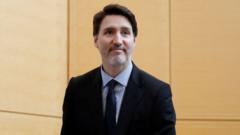Trudeau, who has led Canada for nearly a decade, faces dwindling support as opinion polls indicate a significant lead for the Conservative Party ahead of the upcoming general election.
Trudeau's Potential Resignation: A Turning Point for Canadian Politics

Trudeau's Potential Resignation: A Turning Point for Canadian Politics
Canadian media reports suggest Prime Minister Justin Trudeau may announce his resignation imminently, following mounting pressure from within his party.
In light of escalating challenges and internal strife, the Prime Minister is reportedly weighing his future with the Liberal Party, amid talk of a potential leadership transition before the impending election.
Justin Trudeau, the incumbent Prime Minister of Canada, might reveal his resignation within days, reports suggest. This decision could mark the end of his nine-year tenure leading the Liberal Party, as he grapples with increasing pressure from his own members of parliament (MPs). Just last month, Finance Minister Chrystia Freeland resigned, citing disagreements over responses to potential tariffs on Canadian goods threatened by US leaders, notably Donald Trump.
With a general election looming—scheduled before October—public sentiment is not in Trudeau's favor. Polls indicate his Liberal Party lags significantly behind the Conservatives, raising concerns about his ability to unite the party for a successful campaign. The Globe and Mail has mentioned that Trudeau might announce his plans prior to an upcoming caucus meeting, aiming to steer clear of the impression that he was ousted by his own team.
Though Trudeau’s next steps remain undecided, any leadership change could prompt demands for an early election amid the political turmoil. The upcoming election is crucial, as whoever takes over the helm will have to tackle trade concerns, especially given Trump’s threats of steep tariffs contingent on border security measures regarding irregular migration and drug trafficking.
Trudeau's departure would signify a shift in Canadian political dynamics. He first ascended to leadership in 2015, bringing hope for an open immigration policy, robust taxation for the wealthy, and comprehensive climate action. However, his administration has faced numerous scandals and a decline in popularity, primarily due to ongoing economic concerns affecting the populace.
Recent polling reveals that merely 26% of the electorate favor Trudeau as their preferred Prime Minister, placing him firmly behind Conservative leader Pierre Poilievre by 19 points. Given that only two Canadian Prime Ministers have maintained four consecutive terms, the stakes are high.
Poilievre, who rose to prominence in 2022 with promises to alleviate tax burdens and combat inflation, has resonated with voters dissatisfied with the current administration’s strategies. Trudeau's situation is compounded by the resignation of key cabinet members and the looming economic challenges posed by the incoming US administration. The need for swift and strategic leadership in these uncertain times could redefine the future of Canadian politics.
Justin Trudeau, the incumbent Prime Minister of Canada, might reveal his resignation within days, reports suggest. This decision could mark the end of his nine-year tenure leading the Liberal Party, as he grapples with increasing pressure from his own members of parliament (MPs). Just last month, Finance Minister Chrystia Freeland resigned, citing disagreements over responses to potential tariffs on Canadian goods threatened by US leaders, notably Donald Trump.
With a general election looming—scheduled before October—public sentiment is not in Trudeau's favor. Polls indicate his Liberal Party lags significantly behind the Conservatives, raising concerns about his ability to unite the party for a successful campaign. The Globe and Mail has mentioned that Trudeau might announce his plans prior to an upcoming caucus meeting, aiming to steer clear of the impression that he was ousted by his own team.
Though Trudeau’s next steps remain undecided, any leadership change could prompt demands for an early election amid the political turmoil. The upcoming election is crucial, as whoever takes over the helm will have to tackle trade concerns, especially given Trump’s threats of steep tariffs contingent on border security measures regarding irregular migration and drug trafficking.
Trudeau's departure would signify a shift in Canadian political dynamics. He first ascended to leadership in 2015, bringing hope for an open immigration policy, robust taxation for the wealthy, and comprehensive climate action. However, his administration has faced numerous scandals and a decline in popularity, primarily due to ongoing economic concerns affecting the populace.
Recent polling reveals that merely 26% of the electorate favor Trudeau as their preferred Prime Minister, placing him firmly behind Conservative leader Pierre Poilievre by 19 points. Given that only two Canadian Prime Ministers have maintained four consecutive terms, the stakes are high.
Poilievre, who rose to prominence in 2022 with promises to alleviate tax burdens and combat inflation, has resonated with voters dissatisfied with the current administration’s strategies. Trudeau's situation is compounded by the resignation of key cabinet members and the looming economic challenges posed by the incoming US administration. The need for swift and strategic leadership in these uncertain times could redefine the future of Canadian politics.






















